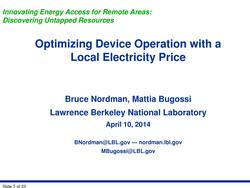Difference between revisions of "Optimizing Device Operation with a Local Electricity Price"
From energypedia
***** (***** | *****) m |
***** (***** | *****) m |
||
| (11 intermediate revisions by 2 users not shown) | |||
| Line 1: | Line 1: | ||
| − | |||
[[File:MES Berkley small.png|center|800px|Innovating Energy Access for Remote Areas: Discovering Untapped Resources|alt=Innovating Energy Access for Remote Areas: Discovering Untapped Resources|link=Innovating Energy Access for Remote Areas: Discovering Untapped Resources]] | [[File:MES Berkley small.png|center|800px|Innovating Energy Access for Remote Areas: Discovering Untapped Resources|alt=Innovating Energy Access for Remote Areas: Discovering Untapped Resources|link=Innovating Energy Access for Remote Areas: Discovering Untapped Resources]] | ||
{| border="0" cellspacing="3" cellpadding="0" align="center" style="font-size: 14px; width: 805px;" | {| border="0" cellspacing="3" cellpadding="0" align="center" style="font-size: 14px; width: 805px;" | ||
|- | |- | ||
| − | | style="width: 175px; text-align: center; vertical-align: middle; background-color: rgb(139, 45, 45);" | [[File:MES About Icon.png|center|100px|alt=About the International DAAD-Alumni Summer School, Sustainable Provision of Rural RE|link= | + | | style="width: 175px; text-align: center; vertical-align: middle; background-color: rgb(139, 45, 45);" | [[File:MES About Icon.png|center|100px|alt=About the International DAAD-Alumni Summer School, Sustainable Provision of Rural RE|link=Innovating Energy Access for Remote Areas: Discovering Untapped Resources#About]] |
| style="width: 175px; text-align: center; vertical-align: middle; background-color: rgb(200, 200, 200);" | [[File:MES Doumentation grey Icon.png|center|100px|Documentation|alt=Programme|link=Innovating Energy Access for Remote Areas: Discovering Untapped Resources - Documentation]] | | style="width: 175px; text-align: center; vertical-align: middle; background-color: rgb(200, 200, 200);" | [[File:MES Doumentation grey Icon.png|center|100px|Documentation|alt=Programme|link=Innovating Energy Access for Remote Areas: Discovering Untapped Resources - Documentation]] | ||
| style="width: 175px; text-align: center; vertical-align: middle; background-color: rgb(139, 45, 45);" | [[File:MES Programe Icon.png|center|100px|Programme|alt=Participants Presentations|link=Innovating Energy Access for Remote Areas: Discovering Untapped Resources - Programme]] | | style="width: 175px; text-align: center; vertical-align: middle; background-color: rgb(139, 45, 45);" | [[File:MES Programe Icon.png|center|100px|Programme|alt=Participants Presentations|link=Innovating Energy Access for Remote Areas: Discovering Untapped Resources - Programme]] | ||
| Line 14: | Line 13: | ||
= Optimizing Device Operation with a Local Electricity Price = | = Optimizing Device Operation with a Local Electricity Price = | ||
| − | Presenter: '''Bruce | + | Presenter: '''Bruce Nordman,''' (Lawrence Berkeley National Laboratory, United States of America) |
| + | |||
| + | <br/> | ||
= Overview = | = Overview = | ||
| Line 20: | Line 21: | ||
{| border="0" cellspacing="3" cellpadding="5" style="width: 800px;" | {| border="0" cellspacing="3" cellpadding="5" style="width: 800px;" | ||
|- | |- | ||
| − | | Making optimal use of available electric power is important for efficiency, | + | | Making optimal use of available electric power is important for efficiency, functionality and to reduce capital costs, particularly in developing countries. The presentation shows the results from simulating the behavior of refrigerators and freezers that vary their operation according to a local price and price forecast. The price is set to the availability of local photovoltaic power and is used to adjust the temperature set-points of the devices. For off-grid systems, this can be used to concentrate consumption during times of PV availability, to increase efficiency and to reduce battery size. The simulations presented show a reduction of up to 26% of the energy used by the devices at night.<ref>Optimizing Device Operation with a Local Electricity Price. Bruce Nordman and Mattia Bugossi.</ref> |
| − | | [[File: | + | | [[File:Optimizing Device Operation with a Local Electricity Price.pdf|250px|Optimizing Device Operation with a Local Electricity Price.pdf|alt=File:Optimizing Device Operation with a Local Electricity Price.pdf]]<br/> |
|} | |} | ||
| Line 28: | Line 29: | ||
= References<br/> = | = References<br/> = | ||
| − | <references /><br/> | + | <references /><br/>__NOEDITSECTION__ |
| − | + | __NOTOC__ | |
| − | + | __NOTITLE__ | |
| − | [[Category: | + | [[Category:Grid]] |
| − | |||
| − | |||
[[Category:Conference_Documentation]] | [[Category:Conference_Documentation]] | ||
Latest revision as of 11:15, 19 January 2016
Optimizing Device Operation with a Local Electricity Price
Presenter: Bruce Nordman, (Lawrence Berkeley National Laboratory, United States of America)
Overview
| Making optimal use of available electric power is important for efficiency, functionality and to reduce capital costs, particularly in developing countries. The presentation shows the results from simulating the behavior of refrigerators and freezers that vary their operation according to a local price and price forecast. The price is set to the availability of local photovoltaic power and is used to adjust the temperature set-points of the devices. For off-grid systems, this can be used to concentrate consumption during times of PV availability, to increase efficiency and to reduce battery size. The simulations presented show a reduction of up to 26% of the energy used by the devices at night.[1] |  |
References
- ↑ Optimizing Device Operation with a Local Electricity Price. Bruce Nordman and Mattia Bugossi.




















